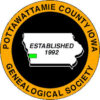From the 1882 and 1907 Potawattamie County Histories
Hardin township was organized in 1869, but for many years prior to this formed a part of the territory known as Kane Township. It is a full Congressional Township, lying in the form of a square, and containing thirty-six sections. Its boundaries are: Norwalk Township on the north, Washington Township on the East, Keg Creek Township on the south, and Garner Township on the west. Keg Creek is the largest stream in the township.
Perhaps the first white man who lived for any length of time within the boundaries of Hardin Township, was Richard Hardin, in honor of whom the township was named. “Old Dick Hardin,” as he was familiarly called, became a resident of the township long before the coming of Mr. Price. He spent most of his time in hunting, trapping and trading with the Indians, and for a number of years kept a station on the old stage route.
Early township officers were: J. M. Underwood, Eugene Steepfell and F. B. Chambers, trustees, and M. W. Davis, clerk; A. F. Mammen and A. K. Chambers, justices of the peace; J. O. Chambers, constable and H. R. Smith, assessor.
Among those who, by industry and integrity, have made themselves prominent were D. F. Dryden and Elias Quick, the former being a farmer and large stock raiser. He was for a time a member of the board of supervisors, and an ex-soldier of the civil war. The latter started a store in 1883, and a postoffice was established at this store in 1884, and named Quick postoffice.
FIRST EVENTS
- Settlers: Richard Hardin; Stephen Williams; J. C. Barnard; Augustus Ayers; 1849 — Reece D. Price; 1857 — Mrs. Gratin Perry and family, R. C. Thomas
- Birth: 1850, Nov 16 — J. A. Price
- Death: 1850, Lorenzo Dunn (he was buried near the Mormon settlement, on what was sometimes called Log City.)
- Marriage: Jonathan Patridge
- School: 1857 — taught by Lorenzo Burr in a log cabin. The first school house was erected in 1860
- Bridges: built over Keg creek at the Hardin stage station and Weasel Run. Both built of logs.
- Road: the old stage road running from Des Moines to Council Bluffs, upon which the Western Stage Co. operated.
- Churches: 1880 — Methodists organized a little society called Mount Hope, and another being Presbyterian
- Postoffice: by 1882 there was a postoffice in the township named Snapp and H. S. Alexander was postmaster
- Leading citizens: (in 1882) — Newell Birchard, Perry brothers, Rev. J. S. Rand, J. A. Price, C. Barnard and William F. Plunkett
